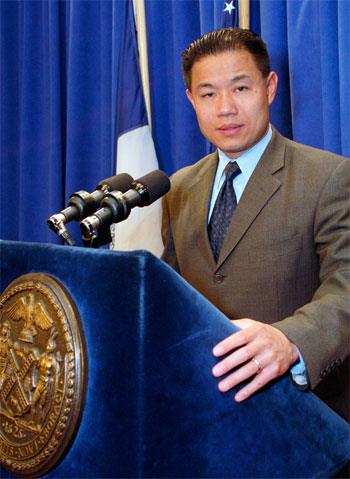

LIU TESTIMONY ON CITY COUNCIL TAXI BILL
******************************************
Yesterday, City Comptroller John C. Liu submitted testimony to the City Council in favor of Intro 433-A, a bill sponsored by Council Member Oliver Koppell that would mandate that the entire City taxi fleet be wheelchair-accessible. The hearing for the bill comes after Liu rejected the contract for the Bloomberg Administration's "Taxi of Tomorrow," a non-wheelchair-accessible vehicle that City Hall had hoped to use to replace the City's entire taxi fleet. Following is Comptroller Liu's testimony:
TESTIMONY OF COMPTROLLER JOHN C. LIU TO THE
CITY COUNCIL TRANSPORTATION COMMITTEE, APRIL 18, 2013
Thank you, Council Member Vacca and all the members of the Transportation Committee for allowing me the opportunity to testify today.
I especially want to acknowledge Council Member Oliver Koppell, Chair of the Council's Committee on Disability Services.
As the prime sponsor of Intro 433-A, his dedication to ensuring that all New York City taxis are wheelchair-accessible has been tireless and unwavering.)
Let me state for the record that I wholeheartedly support Intro 433-A, and I urge the Council to pass this legislation as soon as possible. The need for this bill is greater than ever. Despite more than nearly two decades of advocacy by the disability community, litigation, newspaper editorials, and rejection of the Taxi of Tomorrow contract by my office, this Administration has stubbornly pursued a policy that discriminates against taxi riders who use wheelchairs.
The time for relying on City Hall to do the right thing is over.
Today, with this legislation, the Council can send a clear message: the right of New Yorkers with disabilities to hail a taxi will no longer take a back seat to City Hall's prejudice.
In May 2012, I put City Hall on notice that my office would send back any taxi plan that did not uphold the equal rights required by the Americans with Disabilities Act (ADA).
Accordingly, when the Taxi and Limousine Commission (TLC) forwarded its Taxi of Tomorrow contract to my office in December 2012 with a requirement for less than two percent of the new fleet to be wheelchair-accessible, and which raised serious concerns under the ADA, I rejected the contract. To quote TLC Chairman David Yassky in his recent budget testimony to you: "That is not enough. Period. End of Story. Not Enough."
Chairman Yassky is correct. The entire fleet needs to be accessible.
Disability-rights advocates recently filed a lawsuit against the City, citing the ADA requirement that vans be wheelchair-accessible if they are used as taxis. The Taxi of Tomorrow – otherwise known as NV-200 – sure looks like a van to me.
People with disabilities have a civil right to be able to hail a taxi on the street just like every other non-disabled New Yorker and visitor does. It's just that simple. Period.
The current Taxi of Tomorrow contract reads like a commitment to the "Taxi of Yesterday."
Yesterday was when it was acceptable to deny people with disabilities access to mainstream transportation. ..Yesterday was when it was acceptable to have a separate, segregated taxi system. ..Yesterday was when vehicles were cut up after manufacture to add accessibility features…Yesterday was when policymakers assumed that people with disabilities did not have more than one family member or friend to travel with…Yesterday was when people in wheelchairs had to board from the rear of the vehicle in the middle of oncoming traffic.
By contrast, London, another leading global city, has had a fully accessible taxi fleet since 1989. And London will now be using the same Nissan model selected as New York's Taxi of Tomorrow, but with several crucial differences.
Every NV-200 taxi in London will be accessible straight from the factory, will allow passengers to enter safely from the sidewalk, and will carry multiple passengers.
We have to ask, why can't New York City get a taxi contract that mandates these same features? Why can't New Yorkers get a taxi that is purpose-built to be wheelchair-accessible from the start, without costly and possibly unsafe retrofitting?
In a 2009 report, Mayor Bloomberg recommended that the Taxi of Tomorrow "provide universal accessibility for all passengers, including passengers in wheelchairs." The report, "Age Friendly NYC: Enhancing Our City's Livability for Older New Yorkers" called for the creation of a model accessible yellow cab.
City Hall seems to have forgotten the recommendation it made just over three years ago to provide wheelchair accessibility to all.
With this bill, the recommendation will at last become reality. The next step toward the true Taxi of Tomorrow starts today. Thank you.
Background:
Press Release: Liu Grounds Taxi of Tomorrow
http://comptroller.nyc.gov/press/2012_releases/pr12-12-134.shtm
Liu testimony to the taxi and Limousine Commission, Sept. 6, 2012
http://comptroller.nyc.gov/press/2012_releases/pr12-09-100.shtm
